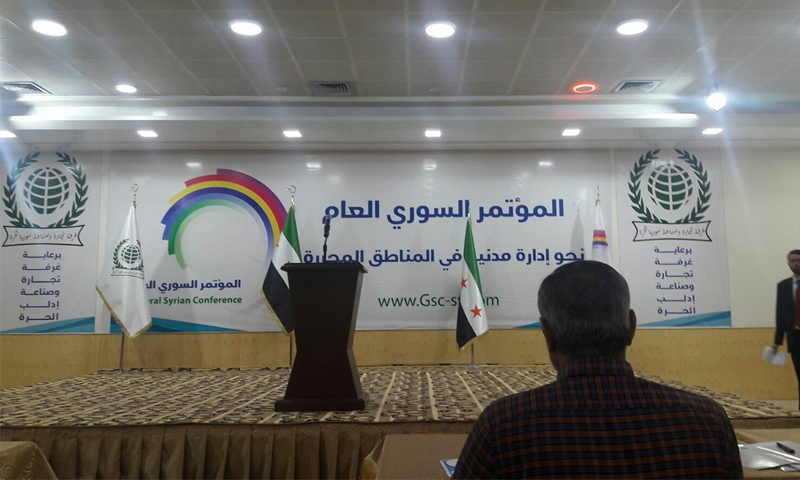



The Syrian General Conference held in Idlib was able to form a constituent assembly and to name a new prime minister, which puts it in a face-to-face challenge with the interim government inside Syria.
Colonel Riad al-Assaad, the founder of the Free Army and a member of the conference, told Enab Baladi that the conference was concluded on Saturday, September 11. The conference resulted in a final statement to form a government that runs the liberated areas in northern Syria.
The interim government rejected the outcome of the conference. Its president, Dr. Jawad Abu Hatab, called it “a declaration of the “Idlibstan” project as did the Syrian Democratic Forces in Qamishli and Afrin”.
The conference is a continuation of the Civil Administration Initiative in the liberated areas, held at the end of last August in Idlib and was attended by about 40 people representing academics, organizations, bodies, and military parties.
The proposal coincided with attempts by Tahrir al-Sham to impose its control on the joints of the province. Activists said that it threatened more than one party in Idlib through forcing them to attend the conference, while arresting those who refused to attend.
The activities of the conference in the countryside of Idlib ended yesterday with the formation of a constituent body to nominate an internal government formed inside Syria. Its missions include determining the functions of the Commission to nominate the Prime Minister and the ratification of the ministries, as well as the formation of a committee to draft the Constitution.
However, the interim prime minister considered it as an “attempt to control institutions with long management experience and extending throughout the Syrian territory”.
Colonel al-Assaad told Enab Baladi that the administration of the conference “coordinated with the government and contacted many,” asserting that they “will be welcome if they attend the founding conference. But, if they declined the invitation, then the government is for the people and not for them”.
As for efforts to form a government under the interim one, al-Assaad said, “chaos prevails in the liberated areas and the government cannot provide the least required elements.”
Al- Assaad refused to describe the conference as a preparation for “Idlibstan”, saying that “this is unacceptable.”
When asked about coordination with the Tahrir al-Sham as the dominant faction in the region, al-Assad said that “Tahrir al-Sham has previously declared that it will be dissolve itself, which is an external and internal demand”. He said that they “did not attend the conference and we did not communicate with them after it ended, either”.
During a Friday prayer sermon in Bensh, Idlib on August 25, the Commander-in-Chief of Tahrir al-Sham, Hashim al-Sheikh (Abu Jaber), said that the body was ready to dissolve itself, under the condition that all factions operating in the north would be dissolved and reunited under one single command.
Conference participants agreed upon “the Islamic law as the only source of legislation and the need to preserve the identity of the Syrian Muslim people.”
In addition to “the overthrow of the illegal regime with all its symbols and pillars and holding it accountable for its committed crimes, as well as liberating the Syrian territory from all the occupying forces, extending security and spreading justice in the liberated areas”.
According to the final statement, the constituent body “carries out the functions of the Shura Council until its members are formed and selected by the Syrian General Conference”.
The participants recommended the need to “establish balanced relations with the countries supporting the Syrian revolution, and reject any foreign intervention and any form of division, federalism and occupation”.
Al-Assaad stressed the importance of communicating with the interim government “in order to bring them inside and participate with the team in the establishment of a new government,” although Abu Hatab’s government is working in the Syrian interior and running most of the local councils in the liberated areas.
The commission took control over Idlib province economically and militarily after fighting with Ahrar al-Sham last July.
These initiatives are seen as attempts to save Idlib from a dark fate, while others dismiss these initiatives and consider them as an increase in dissent among opposition institutions with the presence of the interim government.
The interim government announced at the beginning of September that it was forming an army staff as the nucleus of the unified Syrian army that is in the process of being formed.
Idlib joined the tension-easing agreement as the main outcome of the Astana 6 talks, which ended last Friday and culminated in an agreement that 1,500 troops would come as monitors from Turkey, Russia and Iran.
The Syrian Omran Center for Strategic Studies, expected, in a research paper published a few days ago, the division of the province of Idlib into three areas, in which control is shared by three forces.
The paper divided the province of Idlib into three regions: one region is run by Russia. The second is controlled by Ahrar al-Sham, and Turkey controls the third which is close to its borders.
if you think the article contain wrong information or you have additional details Send Correction